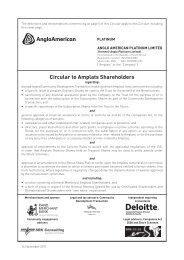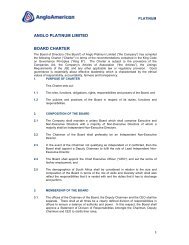ANNUAL REPORT 2001 - Anglo Platinum
ANNUAL REPORT 2001 - Anglo Platinum
ANNUAL REPORT 2001 - Anglo Platinum
- No tags were found...
You also want an ePaper? Increase the reach of your titles
YUMPU automatically turns print PDFs into web optimized ePapers that Google loves.
Chairman’s Statement (continued)procedures and training. Complementing OTTOcertification is targeted for end-2004. Of all thethe scale of this human tragedy and theis the roll-out across the Group of a behaviour-environmental interventions currently beingwork that remains to combat it, not just650600550500450400350300Average monthlymarket prices(<strong>Platinum</strong> US$/oz)9798990001based initiative, which focuses on unsafe acts,the primary cause of more than 90% ofincidents. It is pleasing to report that steadyimprovements were made: the fatal injuryfrequency rate dropped from 0,04 to 0,03 andthe lost-time injury frequency rate fell from 3,8to 2,5 per 200 000 man hours during <strong>2001</strong>.Much work remains to achieve the target of afatality-free <strong>Anglo</strong> <strong>Platinum</strong>; it is with deep regretthat I report 22 fatalities at the operations during<strong>2001</strong>, compared with 23 in 2000 and my sympathiesare extended to the bereaved. Each fatalaccident is met with heartfelt sorrow at the deathof a fellow employee and management’s resolveto stamp out unsafe practices and conditionsand facilitate safe behaviour remains steadfast.SUSTAINABLE DEVELOPMENTThe definition of sustainable development isvariously interpreted. The ability of society tomeet its needs today without compromising theability of future generations to provide for theirown needs underpins <strong>Anglo</strong> <strong>Platinum</strong>’s effortsto create an enduring industry that adds moreto society’s wealth than it takes away.<strong>Anglo</strong> <strong>Platinum</strong> continued with its implementationof ISO14001 environmental standardsundertaken, the most significant is theconstruction of the <strong>Anglo</strong> <strong>Platinum</strong> ConvertingProcess (ACP) plant, the commissioning ofwhich will start in the second quarter of 2002.This plant will reduce sulphur dioxideemissions from 130 to less than 20 tons per dayat a capital cost of R1,6 billion.The Corporate Social Investment programmeaccelerated during <strong>2001</strong> and will do so again in2002. In particular, the new mining project areason the Eastern Limb of the Bushveld Complex, agenerally depressed region of South Africa withpoverty and high unemployment, will receive thebenefits of <strong>Anglo</strong> <strong>Platinum</strong>’s and its partners’expenditures on education, health, welfare,development and job creation. Special attentionwill be given to emergent local small and mediumenterprises, which will be assisted via focusedprocurement and outsourcing programmes.Increased expenditure is also earmarked for theGroup’s established operations in the North Westand Limpopo (formerly “Northern”) Provinces.<strong>Anglo</strong> <strong>Platinum</strong>’s HIV/AIDS programme is oneof energetic and constructive engagement withemployees and the communities within whichit operates. Prevalence rates vary widely acrossthe Group’s operations, but are estimated toby <strong>Anglo</strong> <strong>Platinum</strong> but by all affectedstakeholders in the region as a whole,there remains a 78% majority thathas not contracted HIV. To ensurethe long-term sustainability ofour business, the programmewill therefore focus on keepinguninfected employees wellthrough awareness campaignsand on voluntary counsellingand testing linked towellness programmes forthose infected with the virus.HUMAN RESOURCESThe Group has long recognised thatmastery of its future will rely uponattracting, recruiting, developing andretaining quality employees. In pursuit ofits strategic growth objectives, <strong>Anglo</strong><strong>Platinum</strong>’s Human Resource Developmentprogramme, employment equity plans,AIDS/HIV endeavours and educationefforts continue to be closely reviewed andco-ordinated. In this way, the staffing ofcurrent and future operations will proceedrationally, optimally and smoothly, despitethe formidable recruitment and trainingand practices during <strong>2001</strong> and Group-wideaverage around 22%. Without detracting fromchallenges that remain.6


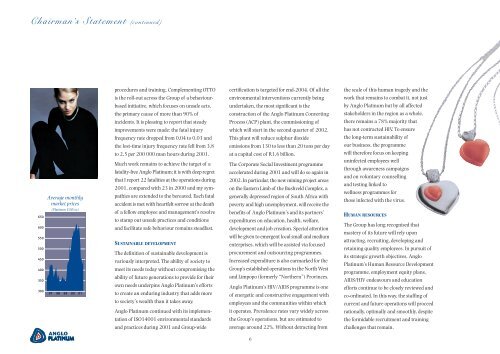
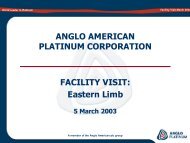
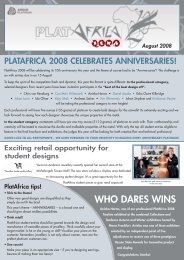
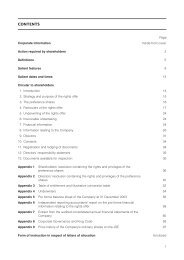
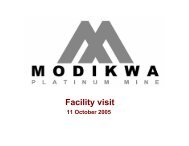
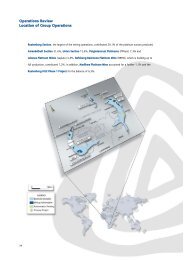
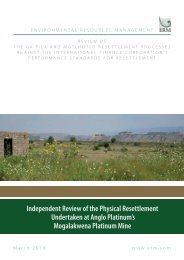


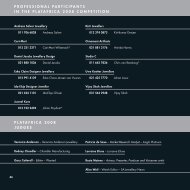
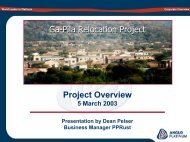

![[PDF] Mogalakwena Mine - Anglo Platinum](https://img.yumpu.com/43065142/1/184x260/pdf-mogalakwena-mine-anglo-platinum.jpg?quality=85)
